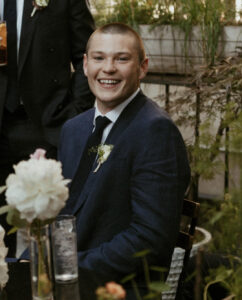INDS B.A.: A Social Science Approach to Sports Injuries and Recovery
My INDS Degree
I am excited to introduce my degree plan in A Social Science Approach to Sports Injuries and Recovery. I developed my fascination with sports medicine and athletic training near the end of my time in high school while I was playing on both the varsity basketball and volleyball teams. While playing sports, I always felt like coaches and team trainers had some secret knowledge about performance that I did not know; they seemed to know ways to make us stronger, faster, and overall better at our sport through various stretching routines and off-season workouts that we as athletes did not. I became extremely interested in this pursuit of getting the most out of my body, and as my senior season of basketball wound down in 2020 I started spending more and more time in my athletic trainer’s office. I spent this time bugging her about the tedious details of training and explaining my aches and pains to her daily just to see how she would go about treating them. I knew I wanted to continue my participation in sports when I attended college and beyond, and I feel that I have found my way to do that.
Post Graduation Plans
After graduating from UMBC I plan to continue on the track to becoming an Athletic Trainer while also continuing to play volleyball at the college level. My choice of graduate program depends heavily on volleyball recruitment, however, I will only choose a school that also has a strong Master’s program in Athletic Training such as George Mason University. My degree plan prepares me for this track by covering the necessary prerequisites in areas such as Biology and Chemistry as well as providing me with the 50 hours of shadowing a trainer that are required for entry by master’s programs like George Mason’s. Upon completion of my master’s degree, I will need to pass the Board of Certification exam for Athletic Trainers. After finishing this certification process I plan on working with a college or professional sports team as a trainer, ideally with a smaller size team such as volleyball that will allow me to maintain personal connections with my athletes and allow me to work with them holistically.
Courses In My INDS Degree
✅ Understanding the Human Body: In order to understand various injuries sustained by athletes, I
will study the musculoskeletal system and how that system can be healed. (BIOL 251/252, PSYC 306/335, INDS 410, KNES 313)
✅Social context: Social forces in athletes’ lives can influence both their performance and relationship with healthcare. I seek to understand the cultural, social, and psychological drivers of these forces and apply them to how they impact athletic performance. In turn, this will give me knowledge of how I can best serve athletes in this role. (ANTH 312, SOCY 321/351, PSYCH 210/340, AMST 200, EHS 340)
✅Healthy behaviors and Communication Skills: In my holistic approach as an Athletic Trainer, I plan to discuss with athletes the development of healthy habits, including diet, rest, and other healthy behaviors. To accomplish this, I will need to know what athletes can do to improve performance and also be able to communicate it to them effectively. (BIOL 233, PSYCH 385, MLL 305, PBHL 340, EHS 311)
✅ Individualized Study: Preparing for a career in Athletic Training demands that I learn how to work between disciplines and combine areas to build a tailored knowledge base. (INDS 330/335/399/410/430/480/490)
